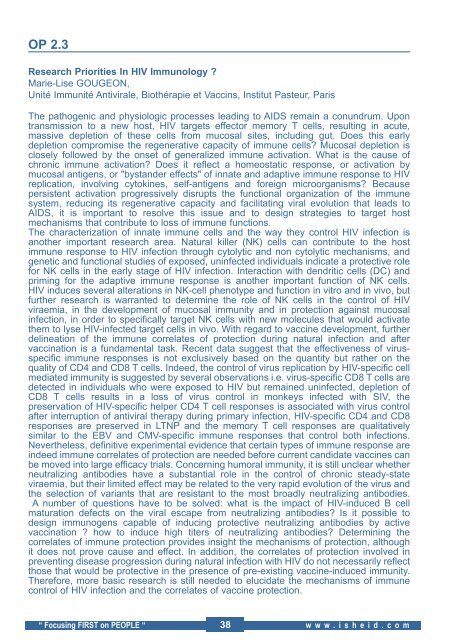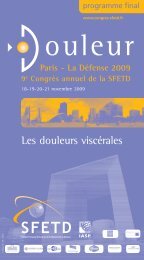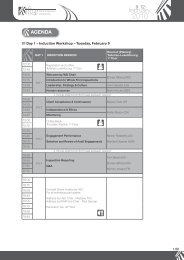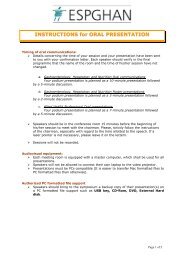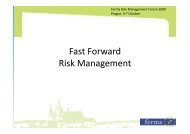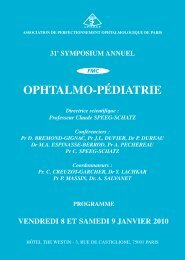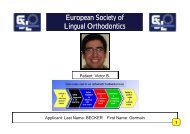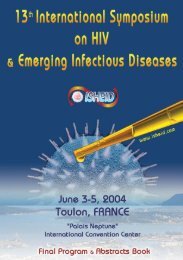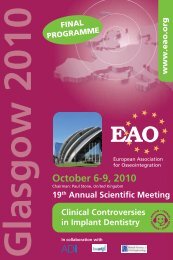final program.qxd - Parallels Plesk Panel
final program.qxd - Parallels Plesk Panel
final program.qxd - Parallels Plesk Panel
You also want an ePaper? Increase the reach of your titles
YUMPU automatically turns print PDFs into web optimized ePapers that Google loves.
OP 2.3<br />
Research Priorities In HIV Immunology ?<br />
Marie-Lise GOUGEON,<br />
Unité Immunité Antivirale, Biothérapie et Vaccins, Institut Pasteur, Paris<br />
The pathogenic and physiologic processes leading to AIDS remain a conundrum. Upon<br />
transmission to a new host, HIV targets effector memory T cells, resulting in acute,<br />
massive depletion of these cells from mucosal sites, including gut. Does this early<br />
depletion compromise the regenerative capacity of immune cells? Mucosal depletion is<br />
closely followed by the onset of generalized immune activation. What is the cause of<br />
chronic immune activation? Does it reflect a homeostatic response, or activation by<br />
mucosal antigens, or "bystander effects" of innate and adaptive immune response to HIV<br />
replication, involving cytokines, self-antigens and foreign microorganisms? Because<br />
persistent activation progressively disrupts the functional organization of the immune<br />
system, reducing its regenerative capacity and facilitating viral evolution that leads to<br />
AIDS, it is important to resolve this issue and to design strategies to target host<br />
mechanisms that contribute to loss of immune functions.<br />
The characterization of innate immune cells and the way they control HIV infection is<br />
another important research area. Natural killer (NK) cells can contribute to the host<br />
immune response to HIV infection through cytolytic and non cytolytic mechanisms, and<br />
genetic and functional studies of exposed, uninfected individuals indicate a protective role<br />
for NK cells in the early stage of HIV infection. Interaction with dendritic cells (DC) and<br />
priming for the adaptive immune response is another important function of NK cells.<br />
HIV induces several alterations in NK-cell phenotype and function in vitro and in vivo, but<br />
further research is warranted to determine the role of NK cells in the control of HIV<br />
viraemia, in the development of mucosal immunity and in protection against mucosal<br />
infection, in order to specifically target NK cells with new molecules that would activate<br />
them to lyse HIV-infected target cells in vivo. With regard to vaccine development, further<br />
delineation of the immune correlates of protection during natural infection and after<br />
vaccination is a fundamental task. Recent data suggest that the effectiveness of virusspecific<br />
immune responses is not exclusively based on the quantity but rather on the<br />
quality of CD4 and CD8 T cells. Indeed, the control of virus replication by HIV-specific cell<br />
mediated immunity is suggested by several observations i.e. virus-specific CD8 T cells are<br />
detected in individuals who were exposed to HIV but remained uninfected, depletion of<br />
CD8 T cells results in a loss of virus control in monkeys infected with SIV, the<br />
preservation of HIV-specific helper CD4 T cell responses is associated with virus control<br />
after interruption of antiviral therapy during primary infection, HIV-specific CD4 and CD8<br />
responses are preserved in LTNP and the memory T cell responses are qualitatively<br />
similar to the EBV and CMV-specific immune responses that control both infections.<br />
Nevertheless, definitive experimental evidence that certain types of immune response are<br />
indeed immune correlates of protection are needed before current candidate vaccines can<br />
be moved into large efficacy trials. Concerning humoral immunity, it is still unclear whether<br />
neutralizing antibodies have a substantial role in the control of chronic steady-state<br />
viraemia, but their limited effect may be related to the very rapid evolution of the virus and<br />
the selection of variants that are resistant to the most broadly neutralizing antibodies.<br />
A number of questions have to be solved: what is the impact of HIV-induced B cell<br />
maturation defects on the viral escape from neutralizing antibodies? Is it possible to<br />
design immunogens capable of inducing protective neutralizing antibodies by active<br />
vaccination ? how to induce high titers of neutralizing antibodies? Determining the<br />
correlates of immune protection provides insight the mechanisms of protection, although<br />
it does not prove cause and effect. In addition, the correlates of protection involved in<br />
preventing disease progression during natural infection with HIV do not necessarily reflect<br />
those that would be protective in the presence of pre-existing vaccine-induced immunity.<br />
Therefore, more basic research is still needed to elucidate the mechanisms of immune<br />
control of HIV infection and the correlates of vaccine protection.<br />
“ Focusing FIRST on PEOPLE “ 38 w w w . i s h e i d . c o m


